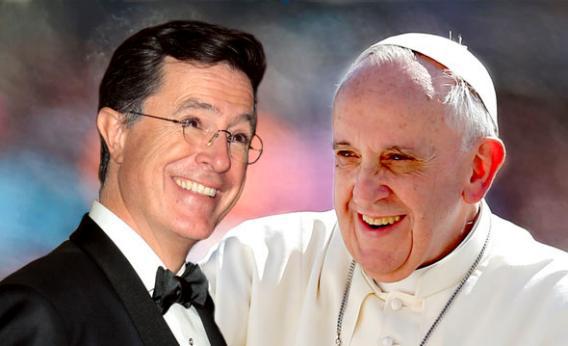Supreme Court Justice Antonin Scalia has always reminded me of the robed men of the Catholic Church in which I grew up: well-fed and saturnine, burbling with derisive erudition, jolly one moment and imperious the next, a weary disgust often flickering at the edges of the brow and lips. These men only really engaged with the boys; the girls always seemed to them to have wandered into the room by mistake. I’ll never forget the look of vague revulsion on the face of the vast monsignor who served Holy Communion at my confirmation, the corners of his mouth pulling down to contain his nausea at the riffraff they let into the church these days. It’s the shape of a mouth reading an acrid Scalia dissent.
For a lot of reasons—because he is the longest-serving and most boisterous member of America’s own Ecumenical Council, because he frequently addresses Catholic groups, because Andy Borowitz says as much—we think of Justice Scalia as “America’s Catholic,” as my Slate colleague Dahlia Lithwick put it in an email. In fact, you could easily imagine him as America’s first Bishop of Rome, or at least his duly appointed representative. Pope Benedict XVI was a fun cartoon villain because of the fumes of nefarious conspiracy wafting off his haute couture threads—he was Mugatu in a chasuble. Scalia wouldn’t have gone shopping with him, but otherwise they were two hearts beating as one: They’re both deeply conservative, nostalgic for “tradition,” rigid in their interpretations of doctrine, belittling of women and gays, and forever erring on the side of consolidating more power—be it political, social, or religious—in the hands of the already powerful.
What Scalia and Benedict also have in common is that, for all their institutional authority, they represent a last stand against the prevailing, decades-long trend toward a more inclusive, liberal Catholic Church. For proof, of course, just look to Pope Francis, the selfie-taking, Twitter-using, biker gang-blessing, money-hating, atheist-redeeming, female-prisoner’s-foot-kissing Jesuit who made liberal Catholics everywhere gnaw ecstatically on their rosaries with an interview in the Jesuit weekly America magazine (excerpts of which were republished in the New York Times). In the interview, he makes it clear that, in contrast to his glamorous predecessor, Francis wants to frame the church as an institution by and for the poor. He’s sharply critical of “authoritarian” decision-making (specifically from his own past), “closed and rigid thought,” and “censorship.” He addresses the church’s views on homosexuality by posing a question that answers itself: “Tell me: when God looks at a gay person, does he endorse the existence of this person with love, or reject and condemn this person?” He doesn’t condemn birth control, but he does criticize the church’s obsession with it. Most intriguingly, Francis says, “We have to work harder to develop a profound theology of the woman,” and while I have no idea what that means, I guarantee that this thought never crossed the mind of Antonin Scalia, or of any man who ever dropped a wafer in my mouth at Mass.
In other words, Francis is shaping up to be the kind of pope that any lapsed Catholic lightly schooled in liberation theology and Madonna videos can embrace. But even a People’s Pope can seem a remote and shimmering figure—when I was a kid, John Paul II was never much more than a kind-looking grandpa in a plastic picture frame. For a lay Catholic, the literal embodiments of the church are always going to be its local priests and its most prominent cultural figures. So as the title has passed from Benedict to Francis, it follows that U.S. Catholics should have a new pope of their own.
Antonin Scalia, as of Thursday’s papal bombshell, you are no longer America’s Catholic. That mantle has now passed to Stephen Colbert.
Stephen Colbert is the greatest thing to happen to American Catholics since Vatican II. He provides day-to-day proof that devout Catholicism can coexist with critical thinking, irreverence, a guiding belief in equal rights, and a fundamentally anti-authoritarian worldview—by, for example, dishing on the papal doctrine of social justice for the poor with Colbert Report chaplain Jim Martin (editor of America magazine), or breaking character during a congressional panel on rights for migrant farm workers by paraphrasing Scripture: “Whatever you did for the least of my brothers, you did for me.” Colbert is America’s Sunday school teacher and “Catholicism’s best pitch man,” as Patheos.com’s Matt Emerson put it in a beautifully argued 2011 piece. But until now, what he’s been pitching hasn’t necessarily been what the Vatican has been selling.
That’s all changed now. Catholics have a pope who loves the poor, embraces critical thinking, and has a delightful sense of humor—the same holy trinity of virtues that Stephen Colbert, the new America’s Catholic, exemplifies. So the next time Francis travels abroad to commune with his flock, he should save an extra seat in the Popemobile for Colbert. Likewise, I look forward to Francis’ first appearance on The Colbert Report, where rumor has it the duo will convene the Third Vatican Council.
